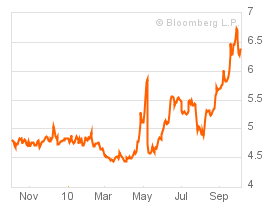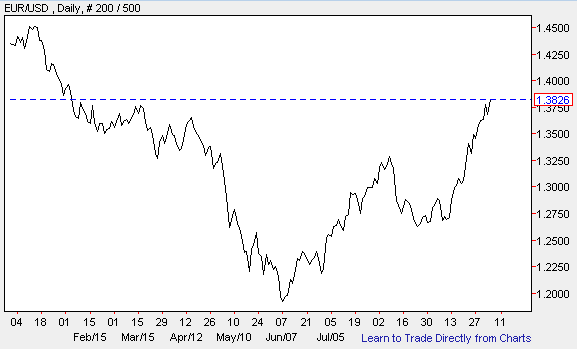Moody’s warned it may cut Ireland’s credit rating again as the country has to foot a huge bill from bailing out its banks. For now, the recent rise in Irish government bond yields seems to have been halted:
 10 year Irish government bond yield. Source: Bloomberg.com
10 year Irish government bond yield. Source: Bloomberg.com
As the house of cards (Euro zone) is wobbling the ECB is doing its best to try to hold things together; last week it bought Eurozone government bonds for EUR 1.38bn – a 10-fold increase over the previous week’s 134m. According to market sources most was spent on Irish government bonds. But yields rose nevertheless. And 1bn is not much in the big scheme of things (total purchases so far EUR 63bn). So why are they doing it at all? Theoretically the ECB could buy as much Irish debt as it wanted and hence stop the rise in yields. But it doesn’t. One explanation is that the ECB simply wants to ensure an orderly market, where liquidity and bid/ask-spreads are at least close to “normal” as not to add to the panic. Another thought: the ECB doesn’t want to be accused of doing “nothing”, but, on the other hand, the “hawks” inside the ECB (the Germans) are trying to prevent the ECB from printing money (= buying government bonds). Hence the “baby steps”.
This is the big difference between the Fed and the ECB – the Fed will do “everything” to prevent deflation; the ECB will not. Doing “everything” means printing money without limits. Hence the dollar’s free fall (and the recent strength of the Euro). A strong Euro will make the economic problems of the PIIGS (Portugal, Ireland, Italy, Greece and Spain) and of Euro-linked Eastern European countries worse.

